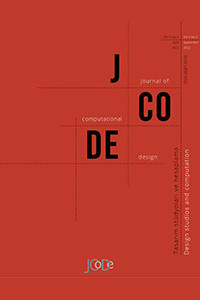Sandalye Tasarımında Üretken Çözümlerin Tasarımcısı Olarak Makine
Sayısal Tasarım, Tasarım Araçları, Tasarım Araştırması, Mobilya Tasarımı, Yapay Zeka
Machine as the Designer of Generative Solutions in Chair Design
Artificial Intelligence, Computational Design, Design Tools, Design Research, Furniture Design,
___
- Anonymous. (2020, January 24). A.I. - Introducing The First Chair Created With Artificial Intelligence. Philippe Starck. https://www.starck.com/a-i-introducing-the-first-chair-created-with-artificial-intelligence-p3801.
- Barros, M., Duarte J. P. and Chaparro, B. M. (2015). A grammar-based model for the mass customisation of chairs: Modelling the optimisation part. Nexus Network Journal, 15, 875-898. https://doi.org/10.1007/s00004-015-0265-5
- Bidgoli, A. and Veloso, P. (2018). Deepcloud the application of a data-driven, generative model in design. ACADIA 2018: Proceedings of the 38th Annual Conference of the Association for Computer Aided Design in Architecture, 176-185. https://arxiv.org/abs/1904.01083
- Bruno, C. (2020). Creativity 4.0. A method to explore the influences of the digital transition on human creativity within the design process. In L. Rapino & I. Mariani (Eds.), Design Research in Digital Era,75-90. FrancoAngeli.
- Buonamici, F. et al. (2020). Generative design: An explorative study. Computer-Aided Design and Applications, 18(1), 144–155. http://doi.org/10.14733/cadaps.2021.144-155
- Giaccardi, E. and Redström, J. (2020). Technology and More-Than-Human Design. Design Issues, 36(4), 33-44.
- Harsuvanakit, A. (2016, October 12). Elbo Chair- Generated in Project Dreamcatcher, Made with Fusion 360. https://gallery.autodesk.com/fusion360/projects/elbo-chair--generated-in-project- dreamcatcher-made-with-fusion-360.
- Jordahn, S. (2019, April 11). Philippe Starck, Kartell and Autodesk unveil "world's first production chair designed with artificial intelligence". Dezeen. https://www.dezeen.com/2019/04/11/ai-chair-philippe-starck-kartell-autodesk-artificial-intelligence-video/
- Laarman, J. (2015, June 25). Bone chair. Joris Laarman. https://www.jorislaarman.com/work/bone-chair/
- Li, D. and Du, Y. (2007). Artificial Intelligence with Uncertainty. CRC Press.
- Li, H. and Lachmayer, R. (2018). Generative Design Approach for Modeling Creative Designs. IOP Conference Series: Materials Science and Engineering, 408(1), 012035. http://doi.org/10.1088/1757-899X/408/1/012035
- Liu, Z., Gao, F. and Wang, Y. (2019). A Generative Adversarial Network for AI-Aided Chair Design. http://dx.doi.org/10.1109/mipr.2019.00098
- McKnight, M. (2017). Generative Design: What it is? How is it being used? Why it’s a game changer. KnE Engineering, 176–181. http://doi.org/10.18502/keg.v2i2.612
- Panero, J. and Zelnik, M. (1979). Human Dimension and Interior Space. The Architectural Press Ltd.
- Phaidon. (2006). Pioneers: Products from Phaidon Design Classics Volume One. Phaidon Press.
- Postell, J. (2012). Furniture Design. John Wiley & Sons.
- Ramesh, A. et al. (2021). Zero-shot text-to-image generation. In International Conference on Machine Learning, 8821-8831
- Thompson, R. (2011). The Manufacturing Guides: Product and Furniture Design. Thames & Hudson.
- Westerveld, C. E. (2021). Generative Design: Recommended actions to smooth the way for production of generative designs with additive manufacturing [Master's thesis]. http://essay.utwente.nl/85976/
- Yayın Aralığı: Yılda 2 Sayı
- Başlangıç: 2019
- Yayıncı: İstanbul Teknik Üniversitesi
Sandalye Tasarımında Üretken Çözümlerin Tasarımcısı Olarak Makine
Mimaride Eklemeli Üretim Sistemlerinin Sınıflandırması için bir Öneri
Dijital Fabrikasyon Süreçlerinde Sanal Gerçekliğin Kitlesel Bireyselleştirmeye Dönük Kullanımı
Çekişmeli Üretken Ağlar ile Plan Üretimi: Haeckel'in Çizimlerinden Palladyan Planlara
Mimarlıkta Dijital Fabrikasyonun Sanatsal ve Şiirsel Boyutu
Kamile ÖZTÜRK KÖSENCİĞ, Yağmur Burcu GÜNEŞ
Deneysel Tiyatro Sahnelerine Parametrik Biçim Grameri ile Sahne-Parter Düzeni Önerilmesi
